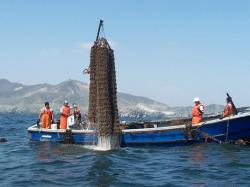World's First ASC Certified Scallops Set To Hit The Market
March 24, 2015 | 3 min to read

AcuaPesca Group is the first bivalve farm to offer its customers ASC certified scallops. The Peru-based business achieved the coveted ASC certification this week for five of its scallop farms proving its environmental and socially responsible practices.
"We have many customers globally who have been eager for us to achieve ASC certification," said Carlos Goldin, President of AcuaPesca. "And, now our products carry the ASC label we have a powerful story to tell our customers. With growing pressure on the environment and our oceans, it becomes more important to help people recognise well-managed production through a robust certification programme, which is what ASC does for us; by combining that recognition with a consumer-facing label it also provides a clear guarantee of provenance to the buyer.
"This is recognition by the most respected farm certification label of the efforts and care taken by our company to ensure that our resources are harvested in a responsible manner and our staff and the local community are cared for."
"AcuaPesca Group should be very proud of their achievements," said Chris Ninnes, ASC's CEO. "It is through their dedication and commitment to responsible aquaculture that they make a significant contribution to protecting our oceans and caring for the environment and community.
"Demand for responsibly certified seafood has continued to grow; we now have over 2000 approved products carrying the ASC logo. I look forward to more companies committing to responsible aquaculture now that ASC certified scallops will be available in the market."
AcuaPesca aims to supply around 2000mt of ASC certified scallop to customers across France, Italy, USA, UK, Australia, New Zealand, Chile and other markets.
Independent certification
AcuaPesca Group were the first bivalve farms to enter the ASC certification programme and their assessment took place in May 2014.
To meet the criteria set out in the ASC Bivalve Standard the group carried out research, such as quantifying the farms' impacts on the benthic environment and defining limits to the ecosystem's carrying capacity. In addition, a social impact assessment was carried out to ensure the ASC's social requirements are met.
AcuaPesca's farms were assessed against the ASC standards by independent, third party certifier Control Union.
#####
About AcuaPesca
AcuaPesca SAC, was founded in 1989 in Casma, Peru, by Mr. Carlos Goldin, with a farm site of five hectares, dedicated to bottom scallop farming.
In the years to follow, the farming method was changed to long lines (suspended farming), a hatchery was built and a Freezing Plant, to integrate the enterprise and assure traceability and premium quality scallops.
The plant is certified to HAACP,IFS, BRC, ISO 9001 and BASC, while the farm is Friends of the Sea (FOS).
Last year the AcuaPesca Group, celebrated 25 years of foundation, operating 1000 hectares in Casma and Nonura (Piura), 2400 long lines, 2 hatcheries, and a Freezing Plant, with a production of 2000 MT of scallop meat.
This year 2015, AquaPesca is building a third hatchery in Guaynuna beach that will increase its production to 2500 MT of scallop meat for 2016 and 3000 MT for 2017.
About ASC
The Aquaculture Stewardship Council (ASC) is an independent, not-for-profit organisation founded by World Wildlife Fund (WWF) and The Sustainable Trade Initiative (IDH) in 2010 to manage the certification of responsible fish farming across the globe.
The ASC standards require farm performance to be measured against both environmental and social requirements. Certification is through an independent third party process and (draft) reports are uploaded to the public ASC website.
The on-pack ASC logo guarantees to consumers that the fish they purchase has been farmed with minimal impacts on the environment and on society.
The ASC standard addresses the following seven principles:
- Legal compliance (obeying the law, the legal right to be there)
- Preservation of the natural environment and biodiversity
- Preservation of the water resources and water quality
- Preservation of the diversity of species and wild populations (for example, minimising escapes that could become a threat to wild fish)
- Monitored and responsible use of animal feed and other resources
- Animal health (no unnecessary use of antibiotics and chemicals)
- Social responsibility (for example, no child labour, health and safety of employees, freedom of assembly, community relations).
For more information about ASC
Website: www.asc-aqua.org
Twitter: @ASC_aqua
LinkedIn: Aquaculture Stewardship Council (ASC)
Blog: ascblog.org
Source: Aquaculture Stewardship Council (ASC) i
